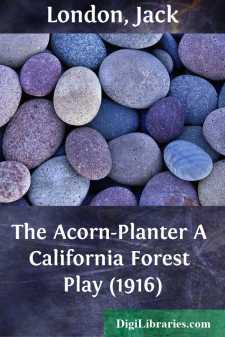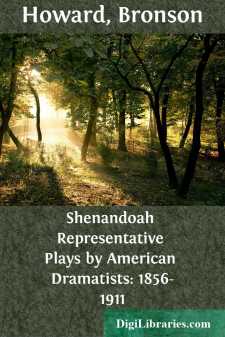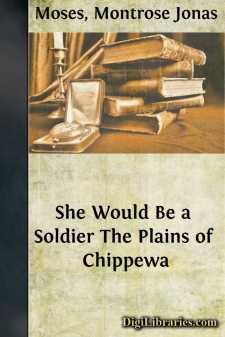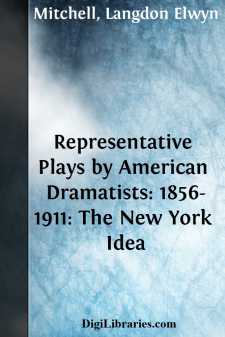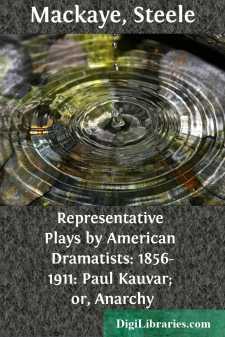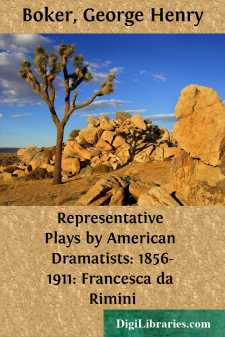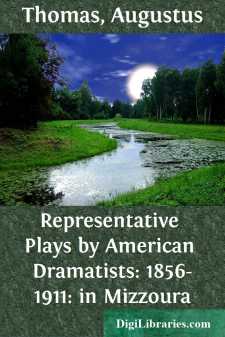Drama
American Books
Sort by:
COSTUMES. The simplicity of the costuming as well as of the stage setting makes the play an easy one for amateurs to produce. The dress of the four school girls should be as modern as possible. Their hair should be elaborately arranged. Hippolyta should wear the dress of an Amazon, armor if possible, or a short skirt, sandals laced high with crossed strings, waist to match the skirt, a crown, and a...
more...
The greatest difficulty to be met in the writing of an Indian play is the extensive misinformation about Indians. Any real aboriginal of my acquaintance resembles his prototype in the public mind about as much as he does the high-nosed, wooden sign of a tobacco store, the fact being that, among the fifty-eight linguistic groups of American aboriginals, customs, traits, and beliefs differ as greatly as...
more...
MR. AND MRS. EDWARD ROBERTS; THE CHOREWOMAN Mrs. Roberts, with many proofs of an afternoon's shopping in her hands and arms, appears at the door of the ladies' room, opening from the public hall, and studies the interior with a searching gaze, which develops a few suburban shoppers scattered over the settees, with their bags and packages, and two or three old ladies in the rocking-chairs. The...
more...
by:
Jack London
ARGUMENT In the morning of the world, while his tribemakes its camp for the night in a grove, RedCloud, the first man of men, and the first manof the Nishinam, save in war, sings of the dutyof life, which duty is to make life more abundant.The Shaman, or medicine man, sings offoreboding and prophecy. The War Chief, whocommands in war, sings that war is the onlyway to life. This Red Cloud denies,...
more...
by:
Bronson Howard
BRONSON HOWARD (1842-1908) The present Editor has just read through some of the vivacious correspondence of Bronson Howard—a sheaf of letters sent by him to Brander Matthews during a long intercourse. The time thus spent brings sharply to mind the salient qualities of the man—his nobility of character, his soundness of mind, his graciousness of manner, and his thorough understanding of the dramatic...
more...
MORDECAI MANUEL NOAH (1785-1851) Mr. Noah was born in Philadelphia, July 19, 1785, the son of Portuguese Jewish descent, it being stated by some sources that his father not only fought in the Revolutionary Army, but was a sufficient friend of George Washington to have the latter attend his wedding. In his early years, he was apprenticed, according to the custom of the day, to a carver and gilder, but...
more...
LANGDON MITCHELL (Born Philadelphia, Pa., February 17, 1862) The performance of "The New York Idea" at the Lyric Theatre, New York, on November 19, 1906, was one of the rare, distinguished events in the American Theatre. It revealed the fact that at last an American playwright had written a drama comparable with the very best European models, scintillating with clear, cold brilliancy, whose...
more...
by:
Steele Mackaye
STEELE MACKAYE (1844-1894) When one realizes the sociological purpose behind Steele Mackaye's "Paul Kauvar; or, Anarchy," it is interesting to note how inefficient the old form of drama was to carry anything more than the formal romantic fervour. Compared with John Galsworthy's treatment in "Strife" and "Justice," it makes one glad that realism came and washed away all...
more...
GEORGE HENRY BOKER (1823-1890) The name of George Henry Boker suggests a coterie of friendships—a group of men pledged to the pursuit of letters, and worshippers at the shrine of poetry. These men, in the pages of whose published letters and impressions are embedded many pleasing aspects of Boker's temperament and character, were Bayard Taylor, Richard Henry Stoddard, and Charles Godfrey Leland,...
more...
by:
Augustus Thomas
AUGUSTUS THOMAS (Born, St. Louis, Mo., January 8, 1859) It is not a new thing for a dramatic author to write prefaces to his plays. We are fortunate in possessing a series of personal opinions in this form that constitute a valuable asset in determining individual attitude and technical purpose. Read Schiller's opening remarks to "The Robbers," Victor Hugo's famous opinions affixed to...
more...





